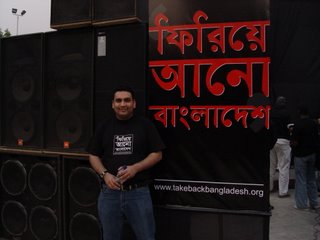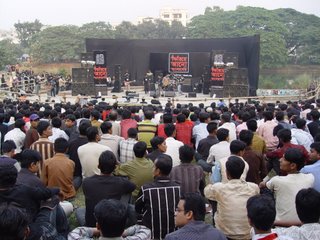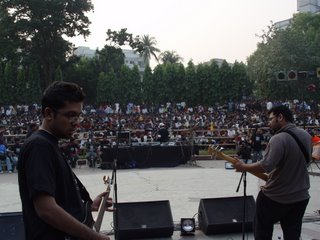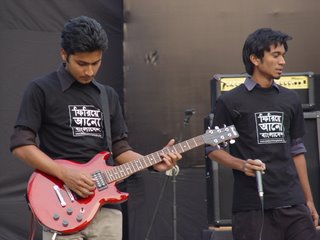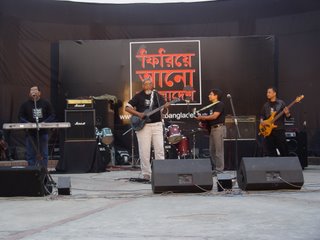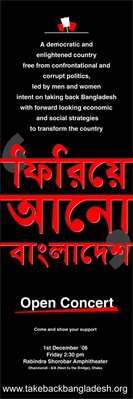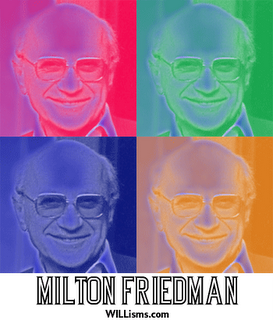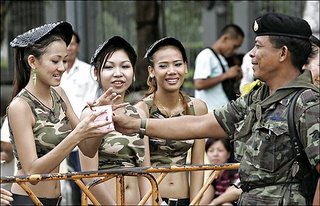This is the "director's cut" of my article that has appeared in today's Daily Star. The printed version is available if you click on the title of this post. Happy reading Basic principle of democracy is the right to choose. Our vote is an indication of who we want to represent us in the Parliament and hence in the decision process that govern our life. The biggest learning that I have taken out of Mr. Nazim Kamran Choudhury’s recent article [Prothom Alo & The Daily Star 6th October 2006] is that the vote base of all our major (and not so major) political parties have eroded to an extent that “undecided” voters account for up to 53% of the electorate. This figure is apparently reflected in many such opinion polls. For the first time in Bangladesh’s young democratic life we are heading into a poll that in theory is going to be decided in the polling booths.
It does not take a political pundit to analyse the rational behind this phenomena. We the voters have lost all faith in our politicians. The current leadership, which have been, pretty much ruling the roost for the last four decades have allowed their parties to become bankrupt of political ideology. To a common voter neither party offers any clear-cut choice. Hence while BNP has lost this support base so has the Awami League. The AL, though not in power, has seen their vote base almost half from 40% to mere 23%. So when majority Bangladesh’s electorate step into the polling booth next the choice will be between for lesser of the two evils.
As Mr. Choudhury predicts, AL might come out on the top with a very clear mandate indeed. One however fears that they will translate this victory as an indication of support for their politics. Far from it. The result will only be a clarion call of people’s anger with the incumbent’s notoriously inept handling of governance and the economy. The voters are not saying that AL will be better masters, rather that BNP will not.
I am an advertising practitioner. In my job it is paramount for us to find out the unique positioning for my product, making it stand out to the consumer. I cannot think of any brand that has been successful in marketing itself by saying “you have no other choice but to use me!” AL seems hell bent in doing just that. Since being sent to Jatiya Sangsad with an increased vote base in 2001, they have not played role of a constructive opposition. If we are to look at their policy in the last 5 years, it has been mostly based on removing a democratically elected government through street protests. Can anyone tell me what has their policy stand been on Education, IT, Tax Ombudsman, Environment, FDI, or anything other than mis-guided notion that BNP party has no legitimacy to rule? In a parliamentary democracy the role of the opposition is to be that of a government in waiting. Their shadow cabinet’s main job is to critique (as opposed to only criticise) the Treasury bench. They are to match policy to policy, statement to statement, and paper to paper the Government on all fronts. AL has failed in that job. Now I am not at all saying the Government has been remotely capable of handling their responsibilities. But come election how do I judge which box to put my seal on?
Ideologically, conventional wisdom says that AL is left of centre in their political belief. And that BNP is right leaning. However if you are to analyse that manifesto of the two parties, it will be difficult to decipher any difference between the two. If you are to look at the speeches of the leadership of the two parties when they are not spilling venom against their bitter rivals, you will see an uncanny similarity in their thought process. It seems that we have entered into an Igloo Ice Cream Parlour and all the choice we have is vanilla or vanilla.
AL today has been given a historic chance. Given the fact that 10 million more people will come into suffrage by next elections, AL’s mistakes of mid-70s is no longer a deciding factor in voting for (or against) them. The slate has been wiped clean. If AL can show maturity, if they can show that they actually have sound political motives, if they can show they have the positive roll to play in our future, the mandate that they get when the election results are announced will give them the foundation to rule the nation into the foreseeable future.
There is as always another way of looking at the “new arithmetic” that Mr. Choudhury wrote about. In advertising we always look out for a consumer need-gap that can be filled. Many brands have been extremely successful exploiting this demand by tailoring their message to suit this need. Our political arena offers such an opportunity. We have lost faith with the two brand leaders. We do not believe in their message. Look at it this way; say if the leading brand of shirt is no different from the second brand, and if both the shirt brands are talking about fashion while their buyers want comfort. Then is it not the perfect time for a third brand to come in and say “we are the most comfortable brand?” What I am getting to is that the field is wide open for a third party to emerge to fill the void left by our current political parties.
So who will bell this cat? Let us look at our usual suspects:
Jatiya Party and General Ershad: JP’s vote bank has according to Mr. Choudhury’s survey reduced from 7 to only 4%. They have become a regional party without the political capital to become a phoenix.
Jamaat: JI too has been reduced to oblivion. Mr. Choudhury predicts but one seat in the next elections to them. It seems the party is caught between a rock and a hard place. Their fundamentalist vote bank is abandoning them for the far right Islamist movements like JMB et. al. While at the same time they are failing to attract the mass voters because of this extreme image that they have.
Bikalpa Dhara / Gono Forum: Bikalpa Dhara showed initial promise. In their first set of posters that they printed, had both Sheikh Mujib and Ziaur Rahman on the same page. But since then it has been downhill. They have not been successful in making themselves noticed outside the diplomatic belt of Gulshan and Baridhara (and of course Munshiganj). Gono Forum, which was to AL, what Bikalpa Dhara is to BNP, has failed to even win a single seat they have so far contested for. In 1996 election, their leader, the much-respected Dr. Kamal Hossain lost his deposit from an “intellectually enlightened” constituency like Dhanmondi. And now to top of all this they have strategically aligned themselves to the AL and hence in the eyes of the voter have blended in with their more stronger partner.
Oli Ahmed: Does anyone still doubt if Col. Oli will bolt from the BNP once the caretaker government takes oath? It is believed that he will take with him a sizeable number of dissident BNP leaders. Mostly they will be the old guards who have lost all their standing under the rising influence of the young turks of the Hawa Bhaban. Col. Oli and his merry men have the distinct possibility of becoming the defacto opposition in the next parliament, with it the power to influence policy in the new era. But for this to happen, they have to play their cards just right. A lot depends on how many seats they can get for themselves through a tactical alliance with the AL.
Civil Society and/or the Army: One scenario that no-doubt will be playing in many political conversation in the next few weeks will be what might happen if the on-going talks between BNP-AL fail. Let us explore a possibility. Say, both AL and BNP refuse to budge from its position on Justice K.M. Hassan. Surely law and order will break down forcing the President facing a constitutional crisis to call on the Armed forces to restore order. The Army are reading the same polls as we are. The people are exasperated with the politicians and will not mind for some authoritarian spring-cleaning. The men in green might call for a national unity government, manned with civil society leadership and look at a longer time horizon till the next elections. The international community will make the required grumblings about the need to return to democratic rule but in essence, looking at popular support behind the new government, not do much to add power to their “official” stand.
The “New” BNP: Let us say we are now in middle of first quarter of 2007. Elections in Bangladesh have taken place and as predicted by Mr. Choudhury, BNP has between 60 and 70 seats in Jatiya Sangsad. Most of its leadership having either lost the elections or having defected, is in disarray. The new AL government moves with vengeance to prosecute the reported corruption of the current young leadership. The party will be ripe for the taking. If Begum Zia has even a fraction of political acumen, she will allow new “clean” leadership to replace the stooges of dubious moral standing being currently promoted by her son. Many from the pro-business caucus find BNP more attuned to their needs than AL and may flock to a re-emerging BNP. Once purged of corrupt self-serving overlords the party can get back to re-energising their base. Rajiv Gandhi successfully did something similar with the Bofor’s Scandal hit Congress party in India after their disgraceful loss to VP Singh.
The “New” AL: Like in BNP, AL too has seen a power struggle between the young and old guards. I am not a betting man. Otherwise my money would be on Saber Hossain Choudhury and him bringing in the Chattra and Jubo League under his belt. And use this as a base to fire up the new entrants to our voter rolls. Let us hope good sense prevails and from the midst of the negativity that is everywhere now, they become the harbinger of positive politics.
Generation 71: The average age in Bangladesh is 21. Vast majority of our population were born post 1971. Sheikh Mujib, Generals Zia and Ershad and all their politics do not mean much to us. While they have their rightful place in our history, we look at our leaders to bridge us to the future and not be lost in our past. Many of us are well educated with degrees from the best institutes of learning from across the world. We see a dream of a strong Bangladesh. We see the hope of a successful Bangladesh. We believe in the promise of a prosperous Bangladesh. I will not be surprised if we soon say enough is bloody enough, it is now our turn to rule. You only need to talk to anyone under the age of 40 today to see that not only does this generation of leaders march to a different beat; they have decided to take altogether a different route to Bangladesh’s future.
Many possibilities. But two things as we see today are certain. Firstly the eventual master of our destiny will be the one who speak and believe in the language of hope. Secondly the politics of the next six months are going to be crucial in deciding what the long-term future of each of the political party is going to be. We are indeed looking at a new arithmetic. Let us now hope our leaders can add.


